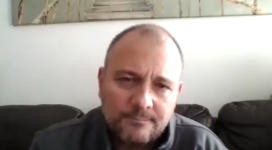Some 600 representatives of US churches and faith-based organizations gathered for the opening of the second annual Ecumenical Advocacy Days for Global Peace with Justice, March 5, in Washington DC. The event, entitled, “I Will Feed Them with Justice,” will continue through March 8, and will focus on trade and debt issues and nuclear disarmament in Africa, Asia, Lain America and the Middle East.
"The vitality and creativity of peace and justice work in the United States is a resource for the global ecumenical family," the general secretary of the World Council of Churches (WCC) Rev. Dr Samuel Kobia said as he began the event.
Kobia explained that those gathered were “in many ways on the leading edge of advocacy work.” The event goes in conjunction with the 2004 focus on the US of the WCC’s Decade to Overcome Violence.
Such events, Kobia said, are an “opportunity to highlight the contributions which US churches and movements have made to the cause of peace", and a chance to build solidarity within churches worldwide.
"We know it is not easy speaking truth to power in the United States these days. But we want you to know that we are with you. We hope that you feel the support of the global ecumenical fellowship of churches worldwide as you conduct your advocacy for a better world," Kobia said.
Through the meeting, the members of the church will call for a safer world through nuclear disarmament. Such efforts for a safer world without nuclear weapons have been a priority to the WCC, Kobia reminded the gatherers.
US religious, scientific and medical leaders will launch “a moral appeal for a safer world without nuclear weapons," by in the context of the Advocacy Days. “We welcome this initiative and hope that you will give this appeal the strongest possible support,” he said.
According to the WCC news-site, Kobia also emphasized two particular gifts that churches bring to advocacy work: spiritual discernment and the fact that they belong to a global Christian fellowship.
"The quest for spiritual discernment must be at the centre of our advocacy. (…) It must be the basis for our words and our actions," said Kobia.
Kobia, while mentioning a list of “"people whose witness has been clearly centered in their spirituality", said that such spiritual discernment of Christians give "strength, conviction, and the courage to withstand the harsh realities of power" at a time when "the forces for war and oppression are ascendant".
While "in 2004, working for peace and justice in the halls of power in the United States is exhausting work", a spiritual perspective gives to Christians "the courage to hope".
Spiritual discernment allows Christians engaged in advocacy efforts also “to step back from the immediate issues and to see the larger picture,” and to make “a particular contribution” centered in values and principles. Political leaders are increasingly “turning to churches for guidance, for ethical reflection, for a moral grounding on the burning issues of the day”, Kobia said.
In addition, Kobia emphasized the vast global Christian community can greatly assist the advocacy work.
“Churches are truly in a unique position” since they are “an incredible network of Christians striving to follow the values of the Gospel in every corner of the globe,” he said.
“I encourage you to reach out to your brothers and sisters in other parts of the world - to hear their stories, to listen to their cries, to channel these hopes and dreams into effective work in the halls of power,” Kobia challenged the audience.
The following sessions on March 6 and 7 will take place at the Doubletree Hotel in Crystal City, Virginia, The March 8 session will take place at the Lutheran Church of the Reformation on Capitol Hill in Washington.







